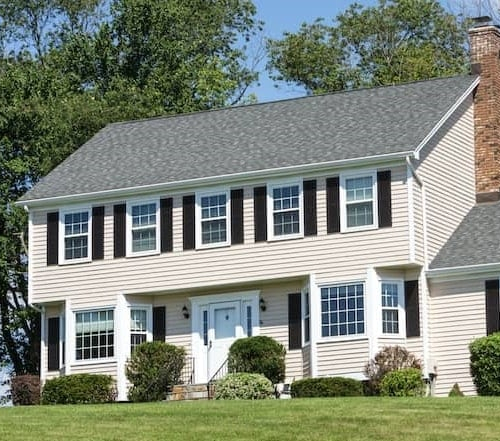Will home prices ever go down?
Contributed by Karen Idelson
Oct 24, 2025
•9-minute read

If you’re looking to buy a home, it’s understandable that you might be discouraged if it seems like home prices are always going up. Historically, home values tend to appreciate over time, but some of the market dynamics in play now make the problem more acute.
Will house prices go down? We’ll take a look at why prices are elevated, what it would take to change this, and some expert predictions. More importantly, we’ll look at how to handle today’s market and what buyers can do.
Why are home prices so high right now?
Home prices are elevated for a few key reasons, including limited inventory, high buyer competition for the inventory, and inflation driving up building costs for new homes.
Limited housing inventory
There are several reasons the physical supply of homes is down right now.
Most of the inventory sold on the market each year is existing homes. New home sales are a fraction of that. In July, inventory of existing homes was 1.55 million units. New home inventory was just 499,000.
To meaningfully bring prices down, there would have to be a surge in new supply. That would need a lot more construction. But that’s not simple either. The National Association of Home Builders has a good explainer on zoning challenges.
There’s been a preference that continues for single-family housing, but less density also means affordability can be a challenge.
Profitability is also a key consideration. The luxury market is more profitable for builders than more affordable housing, according to Autodesk. So more of that higher-end housing coming on the market drives prices higher.
Mortgage rates and buyer competition
While on the surface a challenge to affordability, at one point, it was thought that higher mortgage rates would actually help some buyers because it would drive down competition among those who may have been looking for lower rates and open up inventory for those who really needed to buy.
As a practical matter, that hasn’t happened. Rather, rates in the 6% – 7% range have stuck around long enough now that people are seeing it as the new normal. Plus, they’ve made the rational decision that if they can afford the payment, they can always refinance later.
There are also real market dynamics in play. Gen Z is entering prime home buying age as many look to start families or just get out on their own. According to Redfin®, 26.1% of Gen Z owned their home in 2024. Meanwhile, 55% of millennials own their home. These numbers are expected to only go up in the coming years.
Inflation and high building costs
Based on some estimates, the cost of construction materials was up 37.19% between 2019 and 2024. A couple of things contribute to this. There were supply chain shocks during the pandemic and while some of that has worked its way out so that inflation did level off for a while, once prices go up, they don’t tend to come back down.
Builders have also had to increase wages. The average cost of construction labor is up almost $8 per hour in the last 5 years. As inflation across the economy has pushed prices up, labor demands a raise, and this gets passed to the buyer of a new home.
Are home prices falling anywhere?
There are pockets where prices have fallen across the nation. Looking at data from Redfin in which there were at least 100 sales in a metro, there are areas, many in the South and West, where prices fell year-over-year in July.
What’s interesting about these two regions is that they happen to be some of the most heavily focused for both new and existing home sales. Given that, some may have been overbuilt.
Examples of cities that have seen price drops include Santa Fe, New Mexico, which is down 7.4% year-over-year. Oakland, California has seen price drops of 6.09%. Prices are down in Austin, Texas 3.33% and in Deltona, Florida 3.27%.
It’s not just the South and West. Prices are also down 4.44% in Lincoln, Nebraska, and 3.14% in Topeka, Kansas. In the Northeast, Burlington, Vermont, is down 4.06%. State College, Pennsylvania, has seen prices fall 1.4%.
However, it’s important to note that these price drops are seen in localized pockets and can’t necessarily be generalized at the state or regional level. Every local market is unique so evaluating them individually really matters.
Will home prices ever go down nationally?
In data going back to 1987 from the S&P CoreLogic Case-Shiller Home Price Index, you can see that home prices tend to go up over time. The lone exception in that period was the financial crash that lasted from roughly late 2007 – early 2009.
So rising prices are normal. What’s different about this market is the velocity of those increases. Prices may not necessarily come down, but what might happen is the increases may over time become more in line with inflation.
The steep increases were created out of a low-rate environment and somewhat of a buyer frenzy as people realized the space they had before the pandemic didn’t work for them since they would be spending more time at home.
What economists are predicting
It’s difficult to predict anything with a level approaching total confidence. We were promised time machines and flying cars by now, right? But this is especially true in the housing market because everything is local. With the disclaimer that these are all highly educated guesses, the challenge hasn’t stopped the experts from trying.
- Redfin sees prices remaining flat throughout Q3 and down 1% in Q4.
- In its August 2025 forecast, Fannie Mae sees prices rising 1.2% for the rest of the third quarter, 1.1% in the fourth quarter, and 2.8% overall in 2025. Next year, it expects prices to rise 1.1%.
- The Mortgage Bankers Association predicts prices are going to rise 1.3% for 2025 and 0.3% in both 2026 and 2027 based on the Federal Housing Finance Agency House Price Index.
Factors that could bring prices down
If you remember your high school economics class, prices are on some level a function of supply and demand. It’s fair to say demand for homes has remained quite high, so there are things that would have to happen to increase supply. In short, it all boils down to a large increase in inventory, but there are different ways to get there:
- A surge in mortgage defaults
- A broad recession or housing crash
- Falling mortgage rates reducing the lock-in effect, causing people to put their homes on the market
While a recession could happen at some point just because the economy is cyclical, huge numbers for mortgage defaults and a housing crash aren’t likely to happen. The mortgage underwriting standards today are much different than they were prior to the housing crisis of the late 2000s.
What could have more of an impact is decreasing mortgage rates loosening the lock-in effect. The lock-in effect theorizes that people won’t move if their current mortgage rate is that much below the mortgage rate they can get on new mortgages. If rates start to come down, it could make moving more palatable for many, upping supply.
The flip side of that for buyers is that buying a home could end up costing more because lower rates mean cheaper financing. As a result, people may offer more money.
What could keep prices high in the long term?
There are also factors that could keep prices higher for a longer time frame, including the following:
- Millennials and the older end of Gen Z are entering peak home buying age. Therefore, you’re looking at the possibility of more competition, which could drive prices up.
- There are some areas of the country where scarce land and zoning restrictions may make building net new housing a real challenge.
- Builders are also in business to make a profit. They aren’t always incentivized to build massive amounts of new supply in ways that would create a big enough influx in the market to drive prices down.
One of the big arguments for buying a home if you can swing it, in addition to being able to put down roots and knowing you have a space of your own, is that they tend to appreciate over time. This makes a home a great investment for many.
Should I wait for prices to drop before buying a home?
While the desire to wait until prices drop before buying a home is certainly understandable, you may find you would be better off buying now for several potential reasons:
- Prices might not meaningfully drop enough to make a real difference.
- Mortgage rates are cyclical as well. They could go up, making financing harder.
- Inventory might be low for a long time, depending on the area.
Consider your personal situation any time you’re trying to determine whether buying a home makes sense. Think about your job security, your timeline, and the cost of buying vs. renting.
If you do decide you’re ready to buy, focus not so much on the price or the rate as much as whether you have the down payment and closing costs and whether the payment fits in your budget. If you keep your credit in order, you can always refinance if rates drop.
What can buyers do in a high-price market?
If you’re in a high-priced market, there are things you can do to better prepare yourself when the right opportunity comes along:
- Get mortgage preapproval. When you’re in a bidding war and it’s between you and someone who doesn’t have their financing lined up, sellers will often take the sure thing.
- There may be first-time home buyer programs in your area offering down payment assistance. The obstacle to homeownership is often the up-front cost. Grants or loans on favorable terms can be very helpful. Just make sure your lender accepts the assistance offered by the provider.
- You could try setting your sights on less competitive areas or smaller homes. There’s nothing wrong with having a starter home and moving up later.
- Sometimes it takes two. If you team up with a co-borrower, their income and assets can help you qualify.
FAQ
Now that we’ve touched on the basics, let’s answer several questions you may still have.
Are home prices expected to crash in 2025?
For home prices to crash, there would have to be an abundance of inventory. That’s unlikely to happen given current market conditions. Defaults aren’t at concerning levels and construction isn’t seeing meaningful acceleration. Cheaper homes would increase affordability, but it’s more important to focus on the payment.
Do home prices always go up over time?
While home prices can always dip in the short term, they tend to go up if you hold onto the home in the longer term. During the financial crisis of the late aughts, yes, home prices temporarily dipped. However, even if you bought near the top of the market in June 2006, your home price would still be up more than 79% if you held on to it to this day.
Will a recession cause home prices to fall?
Maybe, maybe not. Home prices behave differently depending on the cause of the recession. In 2008, the market had to quickly absorb a bunch of foreclosed homes because the recession was in part due to loans being based on poor financial fundamentals.
In 2020, it was a very brief recession. There was also a drop in interest rates and people realized their house no longer fit their changing needs. This caused a surge in demand which made prices go up.
Can you negotiate the price of a home in this market?
You can always negotiate the price of a home. How successful you are in negotiation is going to depend on your leverage points.
In a hot market where homes are selling faster and bidding wars are being generated, you have a much worse negotiating position than if homes are sitting on the market or the seller is particularly motivated and can’t wait around. Key things to understand are seller motivation, days on market, and price history. Have there been recent drops?
Is now a good time to buy if I plan to stay long term?
If buying a house makes sense and you plan to stay long term, it’s a good time to buy because prices tend to go up over time. What you shouldn’t try to do is time the market because that’s incredibly difficult. It’s better to focus on the payment and your goals. It can be helpful to speak to a lender about your timeline and budget to see what’s possible.
Bottom line: Will prices go down? It depends
Home prices tend to go up over time. It takes a lot for there to be even short-term price drops seen broadly across the nation. However, there may be short-term price drops that affect local markets. Focus on whether you can afford the payment and up-front costs rather than getting hung up on the rate or price.
While home prices are unlikely to fall without a major increase in supply, smart planning that considers your financial goals can help you succeed. If you’re ready to explore your options, get preapproved through Rocket Mortgage®.
Kevin Graham
Kevin Graham is a Senior Writer for Rocket. He specializes in mortgage qualification, economics and personal finance topics. Kevin has passed the MLO SAFE exam given to mortgage bankers and takes continuing education courses. As someone with cerebral palsy spastic quadriplegia that requires the use of a wheelchair, he also takes on articles around modifying your home for physical challenges and smart home tech. He has a BA in Journalism from Oakland University.
Related resources

8-minute read
When is the best time of year to buy a house?
Wondering about the best time of year to buy a house? We’ve broken down all of the factors to consider, including the season, weather, price and more.
Read more

6-minute read
Historical mortgage rates: 1971 to 2025
See how current mortgage rates compare to historical mortgage rates. Rates are among the highest of the decade but relatively low compared to the 1980s.
Read more

5-minute read
How much above asking price should I offer?
In a competitive housing market, you may ask, “How much above asking price should I offer?” Read on to learn tips for preparing to offer over ask...
Read more